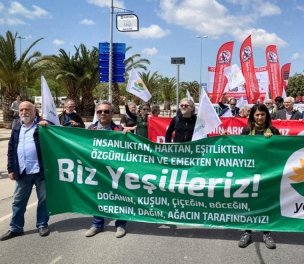"We don't want empty promises": A Fridays for Future Demonstration in İstanbul in March 2021.
Economic woes and identity politics are central in Türkiye's current political arena. Where opposition leader Kemal Kılıçdaroğlu embarks on a path of reconciliation, President Recep Tayyip Erdoğan took the road of foreign policy as a campaign tool to win over electoral support. Headscarfs and LGBTI+ matters seem to overshadow increasingly high temperatures and Türkiye's dry spells.
Both blocks likely paid little attention to Türkiye's Green Left Party, which had its second extraordinary congress on October 16, but probably will not be a serious competitor in the upcoming election, with the country's high election threshold of 10 percent.
Though, there is a broad public consensus that climate crisis is a severe concern for Türkiye. Research conducted by Climate News and KONDA in 2020 shows that 7 out of 10 people are worried about climate crisis, 75 percent indicated that green areas must be protected in the face of climate crisis. Additionally, there are public demands for investing in renewable energy, as the country's primary energy sources are still fossil fuels, such as coal and gas.
Environmental movements in Türkiye
Environmental movements and protests have a long history in Türkiye. In the post-coup era of the 1980s, amidst widespread enforced bans by the state on political organizing, environmental campaigns were deemed "harmless." Türkiye's Green Party was founded during this time, which later merged with the Equality and Democracy party into today's Green Left Party.
It was in the 1980s that multiple environmental movements started to manifest against coal power plants, hotel constructions in natural areas, and changing inner city parks into car parks. These local groups resisting that extensive infrastructural and environmental extraction conceivably became Türkiye's most lively part of the country's environmental movement. Protests, such as, at Gezi Park in 2013, show that environmental resistance often moved beyond ecological matters and into the realm of general political discontent.
Another recent example is the mobilization against Canal İstanbul, an ambitious megaproject to build an artificial waterway connecting the Black Sea and Sea of Marmara, which saw considerable opposition from various civil actors. Their dissatisfaction was based, among others, on possible environmental destruction.
Although these environmental civil society responses mainly result from local protestors' concern for their own community's survival. When ecological mismanagement is linked to authoritarian rule, protests can reach an audience beyond local environmental concerns—possibly creating more extensive support for their causes.
Most recently, international climate movements such as Fridays for Future became more prevalent in Türkiye, which organized 126 marches between March 2019 and 2022. Nonetheless, think-thank Carnegie, sees environmental activism as only providing "some energy and tools" in the upcoming election against the current government.
Rising temperatures and drought
Yet, no nation in the Mediterranean has been hit harsher by climate crisis than Türkiye. The disastrous consequences can be divided into three trends, rising temperatures, dehydration and rising sea levels. Predictions estimate that Türkiye's temperature will go up by 6.5 degrees in the next 80 years. Between 1949 and 2021, the average annual temperature already increased by around 2.0 °C, from 12.6 °C to 14.5 °C. Imminent what type of destruction this possibly lead was visible last summer, when forest fires ravaged the country.
One of the effects of global warming is a 7 percent increase in the air's capacity to retain water vapor. This entails increasingly extreme weather, as the average rainfall likely has a greater spatial variability, meaning more intense short-term severe downpours.
Drought is another major concern. As temperature increases, meteorological drought, the degree of dryness or rainfall deficits, turns into hydrological drought and the impact of rainfall deficits on the water supply such as stream flows, lake levels, and groundwater. Water scarcity will also lead to greater food insecurity, as 74 percent of Türkiye's water consumption is allocated to the agricultural sector.
Last year, Türkiye already saw extreme drought, with İstanbul's water storage level reaching a low not seen in 15 years due to several seasons of low rainfall. Hence, experts stressed the need for more sustainable drinking water supplies. Another worrying matter is the poor management of Türkiye's municipal water systems. It loses around 40 percent of the water when it's transferred from its resource to the households.
The third worrying trend is that of rising sea levels. While ironically Istanbul is coping with possible drought but also conceivably submerge by 2060, according to climate reports. Districts such as Zeytinburnu and Bağdat Avenue might be underwater within the next 40 years.
Government's "green revolution"
All these possible global warming disasters have not left Türkiye's politics cold. President Recep Tayyip Erdoğan stated his determination to play a leading role in the climate crisis last year, announcing "Türkiye's Green Development Revolution." The Presidency Directorate of Communications published a book with the same name, which was presented to President Biden by the Turkish President at the G20 summit in October 2021.
Just a couple of weeks prior, the country finally ratified the Paris Agreement, which requires Türkiye's emissions to be zero by 2053—resulting in "climate change" being added to Türkiye's Ministry of Environment and Urbanization and efforts to phase out coal.
Hopefully, these initiatives will be more successful than the 2019 high-profile initiative of a government-backed record-breaking tree planting in the northern city of Çorum. On November 11, Türkiye's declared National Forestation Day, 11 million trees were planted across the highly symbolic number of 2023 sites. President Erdogan himself was one of the people wielding the spade, but without much luck.
These silver bullets often overlook the complexity of the world. Two months after hitting the Guinness book of most trees planted by a team in one hour, 90 percent of the saplings had already died. They were reportedly planted during the wrong time in the season, not by experts, and died because of insufficient water provision. Mass tree-planting projects have actually been increasingly under fire, becoming a form of greenwashing. Instead of offsetting carbon, they create tree cemeteries.
A recent report by the think-thank Ember shows more positive and feasible pathways for Türkiye's green efforts. With the country's relatively high average of 7.5 hours of sunshine, solar power in combination with wind power could drop the share of fossil fuels from 50 to 24 percent by 2030.
With the upcoming elections, green politics conceivably do not get the prominent space it deserves between all the other calamities. But as seen, climate crisis can further catalyze events resembling the four horsemen of the Apocalypse (disease, war, famine and death) that already seemingly have struck the Black Sea in recent times. (WM/VK)





.jpg)

as.jpg)
.jpg)

.jpg)
.jpg)
.jpg)
.jpg)
.jpg)